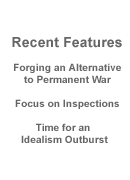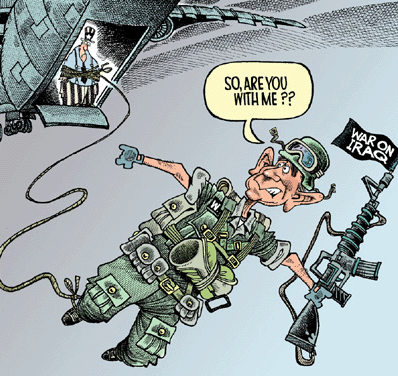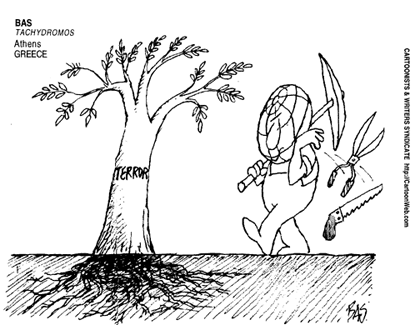jjjj
j j



(Mike
Thompson, The Detroit Free Press, from Slate.com)
SAN FRANCISCO, December 1, 2004--Historically speaking, the new millennium began on September 11, 2001, which was a turning point in global history. As a result of events set in motion that day, we are in a process of global transformation. The outcome of that process is uncertain, and will depend in large part on the nature of our collective response to the new world in which we now live. Our current government has presented us with policies that thus far are leading us toward a less secure world with fewer liberties than before. This does not have to be the case. We can choose to make September 11 a galvanizing event to change the world for the better, instead of for the worse.
The
Bush Administration's broader response to September 11 has been primarily
militaristic, both in tone and in substance, mounting a policy of permanent
war to "defend
the peace." Its approach involves military actions against a
seemingly ever-expanding camp of "evil-doers" throughout the
world. This approach needs to be reversed, in favor of a policy aimed
at a new global peace, rooted in an emerging reality and perception of
global justice. In its
National Security Strategy of the United States, the Administration
acknowledges the insight that fighting poverty will help reduce terrorism,
noting that "(a) world where some live in comfort and plenty, while
half of the human race lives on less than $2 a day, is neither just nor
stable." But, the Administration's policy priorities are reflected
in the respective budget allocations it devotes to the military and to
foreign development assistance (the primary US global anti-poverty program).
The Administration plans a three-year increase in the development assistance
budget from a 2003
level of $10 billion to a 2006 level of $15 billion. At the same time,
by contrast, the President proposed a one-year increase in the
military budget of $48
billion, up from $350
billion in 2002. Doing the math, this means that the amount of US
global development assistance aid is about 4 percent of the amount of
military spending. An honest and serious devotion to dealing with the
problem of global poverty as an element of securing the peace would require
a major change in spending and policy priorities.
It is
clear to me and to many others that the Bush Administration's hyper-militaristic
strategy is taking our nation in the wrong direction. Those of us who
find the Administration's monomania for war to be wrong and/or irrational
need to do everything nonviolently possible to oppose and disempower the
momentum toward permanent war, and to create peaceful alternative responses
to the threat of terrorism and weapons of mass destruction.
Honestly Seeking Peace
If war is ever justified--and that is an arguable point that deserves much exploration--it is only as a stopgap measure, as a short-term evil. If the long-term strategic United States global foreign policy is honestly dedicated to the pursuit of global peace, then America must actively seek peace. If we are not hypocrites, if we truly desire peace, we must actively work to create the conditions in which it occurs. Instead of focusing primarily on military options, we need to seek, in the philosopher William James's brilliant phrase, the "moral equivalent of war," directed at the attainment of a just and lasting peace in the world.
What would it involve to create a moral, peaceful, equivalent of war on a global scale, a policy that directly pursues peace by peaceful means? To give one example, consider the cost of war with Iraq, now running at $146 billion (see below) What if we had to foregone that option and chose to mount the moral equivalent of war with the budget for that one war? What could be accomplished?
|
|
How
about the elimination of extreme poverty throughout the world for one
year? The United Nations Development Programme cites a figure of $40 billion
as an estimate of what would be required on an annual basis to provide
"basic education, health, nutrition, reproductive health, family
planning, and safe water and sanitation" for the remainder of humanity
that does not currently receive those basic social services (Source: Human
Development Report 1998, Chapter 1, p. 22) That amount is less
than one quareter of the monies thus far spent for the Iraq war and approximately
10 percent of the proposed
2005 US military budget. Channeling the money spent on the Iraq war
toward that alternative end would have a profound effect on the world,
not to mention the effect on world opinion. It might not eliminate poverty,
but it would radically reduce its worst components.
Imagine the transformative effect on the world if this were to occur. Imagine the change in the perception of the United States throughout the world. Imagine the deflation of the energies of hatred directed at us today if this were to happen.

One element of such a policy might include the deployment of the US military
to feed the hungry of the world.Think of what the US military could do
in the direct service of peace. In a matter of days, the US military has
the capability to transport tens of thousands of people anywhere in the
world. It can transport millions of tons of material anywhere as well.
It is quite conceivable that, within a time frame of one year, the US
military could be deployed to help distribute foodstuffs to end hunger
and starvation on a global level.
As detailed elsewhere, the
world currently produces enough food to feed everyone on the planet several
times over. The problem of hunger and starvation is therefore entirely
due to the maldistribution of existing foodstuffs. The current global
political-economic system condemns to death every single day many more
people than died in the attacks of September 11, 2001; malnutrition is
a significant factor in the deaths of more than 18,000 children each day
(Source: United
Nations World Food Programme) With a commitment of resources equivalent
to that contemplated for war against Iraq, death from hunger could be
put to an end, along with most of the worst elements of extreme poverty.
A Marshall Plan for the World
The potential for the success of such an approach in combating the threat posed by non-state terror organizations is by no means impractical or hypothetical. There is a perfectly analogous precedent of smaller scale that provides a model for what we need to do. That model is the Marshall Plan.
A bit of history is relevant here. The Treaty of Versailles which ended the first World War created geopolitical and economic conditions that impoverished Germany during subsequent decades. The suffering of the German people became fertile ground for the blame-mongering of Hitler and the Nazi Party that brought about World War II. The German people are not, despite the still-popular American stereotype, naturally militaristic. In fact, as recent international public opinion polls regarding war against Iraq show, they are currently less interested in war than the people of the United States. But, put in the proper conditions, pretty much any people can be charged up for war (or international terror campaigns).
More
visionary leadership prevailed after the Second World War. Recognizing
the folly of the earlier European "peace," American policy makers
pursued an entirely different path, which became known as the "Marshall
Plan." According to its chief architect, Secretary of State George
C. Marshall, the logic of the Plan was as follows: "It is logical
that the United States should do whatever it is able to do to assist in
the return of normal economic health in the world, without which there
can be no political stability and no assured peace. Our policy is directed
not against any country or doctrine but against hunger, poverty, desperation,
and chaos. Its purpose should be the revival of a working economy in the
world so as to permit the emergence of political and social conditions
in which free institutions can exist." (To
read Marshall's entire speech, click here)
As a result of billions of dollars of economic aid to war-torn Europe,
"militarist" Germany became a thriving democracy that now outrivals
the United States in its pursuit of policies of peace. At the epicenter
of two World Wars stands the European Union, confederating the protagonists
of those wars into a prefigured United States of Europe. Not a bad policy.
As suggested by Mark Lance, professor of Peace and Justice Studies at Georgetown University, among others, that is precisely the kind of visionary policy that the United States now needs to create for the world as a whole--a Marshall Plan for the Earth. Such a plan, if implemented, would do much to dry up the wellspring of hatred against the United States around the world. In addition to its fundamental morality, this would be a policy based on a profound insight into human nature: dissatisfied people, rightly or wrongly, look for others to blame for their satisfaction; satisfied people tend to blame themselves for their satisfaction. (For more of this line of reasoning, click here) A policy sincerely dedicated to the pursuit of global justice is the best possible strategy to achieve global peace and security. (update: For more on the global Marshall plan idea, click here)
Global Arms Control and Disarmament
A second element of a foreign policy honestly aimed at peace would be a serious effort toward truly global arms control and disarmament.....(to be continued in a second installment).
© 2004 Joel Federman